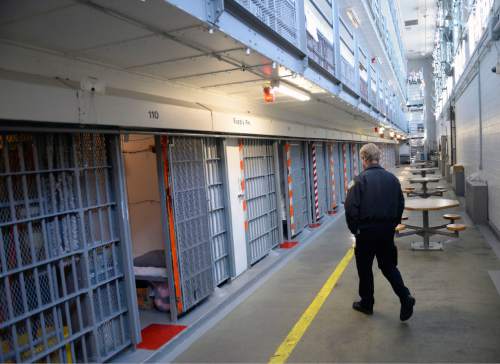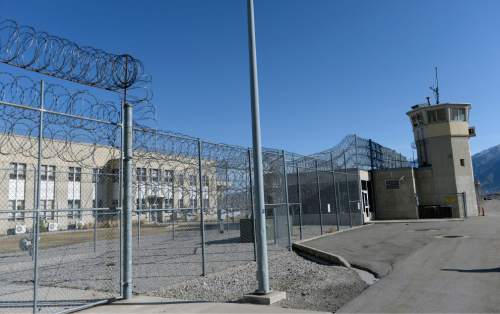This is an archived article that was published on sltrib.com in 2014, and information in the article may be outdated. It is provided only for personal research purposes and may not be reprinted.
Salt Lake City Mayor Ralph Becker doesn't want the state's new prison built within city boundaries, describing two proposed sites as "wholly inappropriate."
He sent a spiral-bound book to the state Prison Relocation Commission on Monday that details environmental concerns and potential hefty building costs. But the city's objections go beyond the financial. City leaders say Salt Lake is doing its part to house inmates and those transitioning back to society. Three community corrections locations, including the new prison violator center, are based in Salt Lake City.
"We feel like we are doing our part, and we just don't think the capital city is the right place for this community," said Jill Remington Love, a former city councilwoman who is now an adviser to Becker.
The commission, which will meet Wednesday, has had little success so far in finding a municipality in favor of housing a new prison. Officials in Saratoga Springs, a fast-growing city in Utah County, previously said they were not interested in the massive building project.
"There is no one vying for this project," said state Sen. Jerry Stevenson, R-Layton, the co-chairman of the commission. And yet, the commission will plow forward with its plan to move the prison from Draper, which will allow for the residential development of a prime land in Salt Lake County.
Stevenson and co-chairman Rep. Brad Wilson, R-Kaysville, plan to announce six potential sites Wednesday, which will include the two Salt Lake City plots, one of which is north of the Salt Lake City International Airport and the other on land owned by Kennecott, near Interstate 80 and 7200 West on the city's west side.
"At this point it would be premature to take anyone off the list," Wilson said. "I think at this point, every city we have talked with has some concerns about it, some who are more concerned than others. Salt Lake City has decided they are against it."
The commission asked Becker and his administration to weigh in on proposals to move the prison and, in response, he provided a detailed analysis of the roads, utilities and environmental concerns. The report, which Wilson has not yet fully digested, says "neither site under evaluation for a state prison in Salt Lake City is economically or physically feasible."
The city argues it would be expensive to provide sewer and water services to either location and that each contains wetlands and endangered species that would make it difficult to build there, and could lead to lawsuits.
The airport site would put inmates in a zone the city says is too loud for people to live in. The west-side site is near an old landfill and the construction may bring up old environmental contaminants that would greatly increase building costs.
Kennecott is not pushing to have its parcel turned into the prison and is prepared to side with Becker.
"If Salt Lake City feels that site is not appropriate," said Kennecott spokeswoman Piper Rhodes, "then we support that decision."
The Prison Relocation Commission includes seven state lawmakers, Utah Department of Corrections chief Rollin Cook and Ron Gordon, the executive director of the state's Commission on Criminal and Juvenile Justice.
Commission members, including Stevenson and Wilson, have said they want a site that is close to courts and hospitals in the metro area, has a minimal environmental impact and enjoys some community support.





